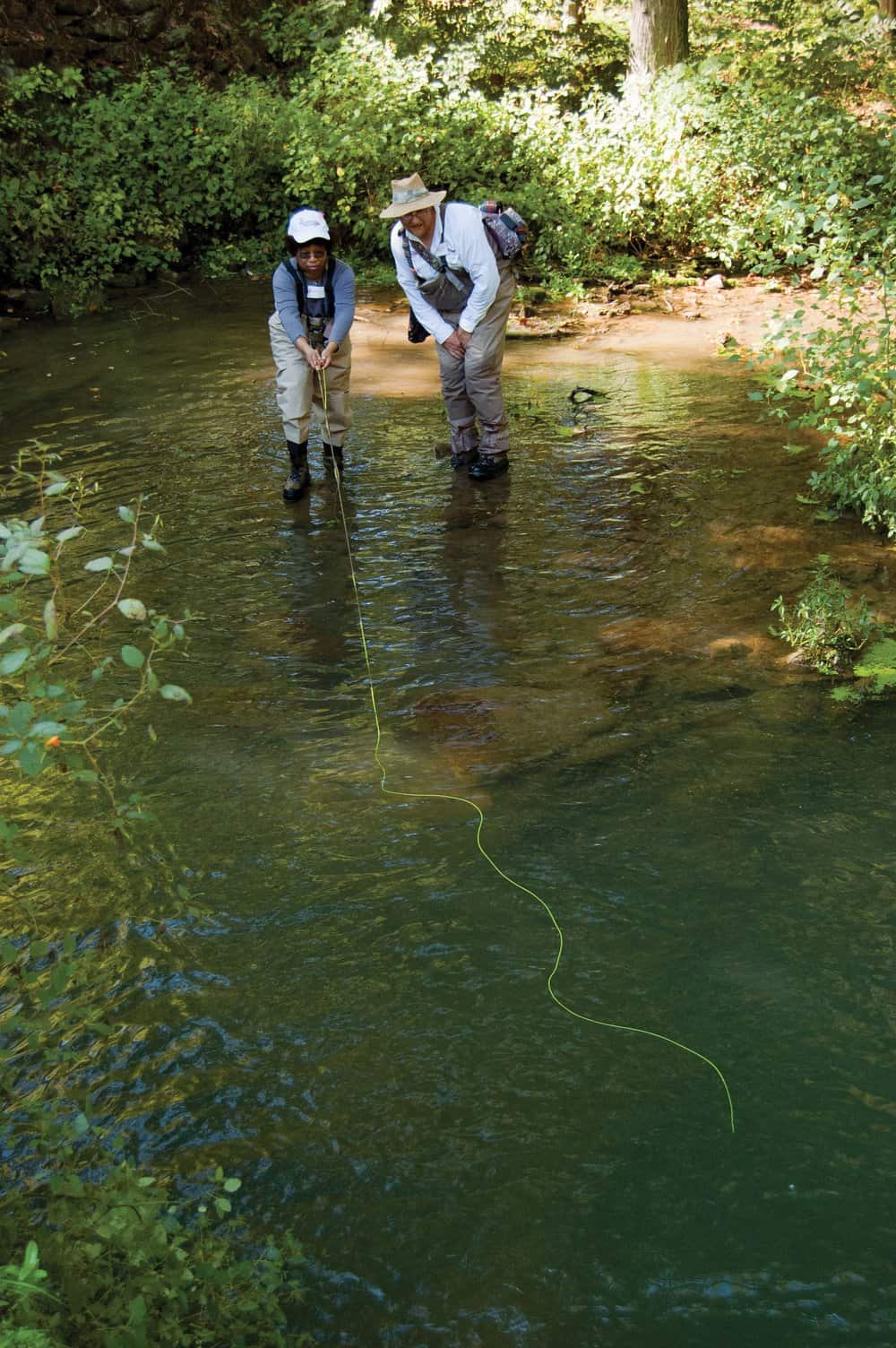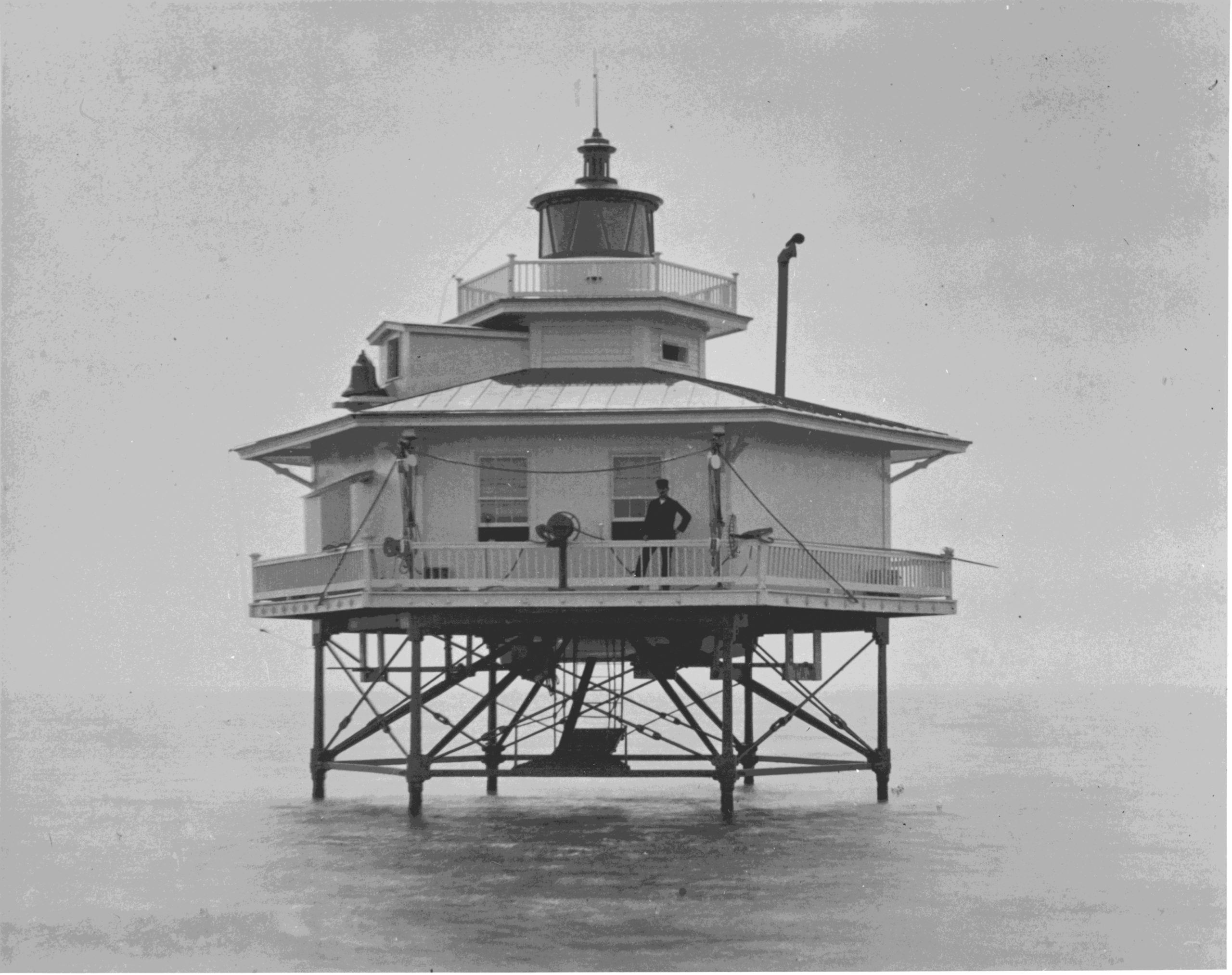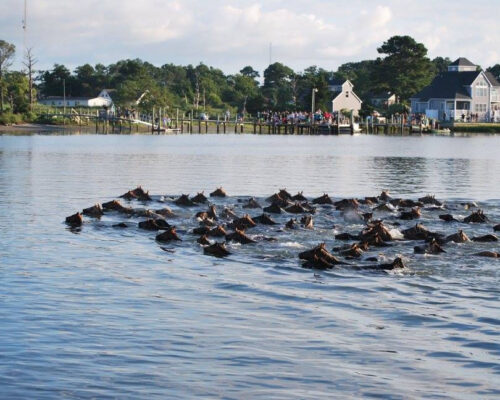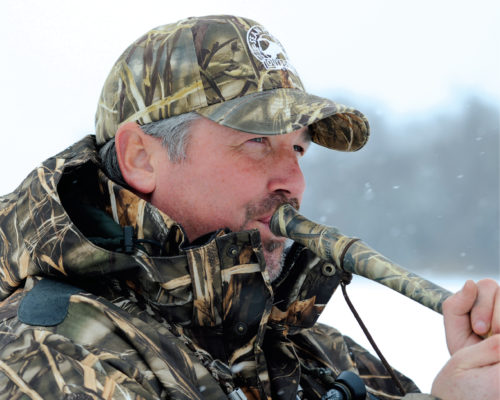Beaver Creek’s path from South Mountain toward the Potomac River isn’t effortless. It dips underground, stumbles over riffles, dodges rocks and bends itself to topography’s will, dallying in placid stretches like this one near an old gristmill in western Maryland. The women fishing this spring-fed trout stream today arrived here after more turbulent journeys. They are navigating breast cancer. The youngest is 30 and was diagnosed at age 28. The oldest is in her 60s. They have endured mastectomies, the effects of radiation and chemotherapy, and the emotional upheaval of their malignancies. But Christina, Deidre, Judy, Kerry, Kim, LaWanda, Mary Jo, Nita, Ruth, Salome, Virginia, Wednesday and Wendy have other concerns on a bright September morning—What’s a roll cast? Where do trout hide? Why a Woolly Bugger? On the final day of a therapeutic retreat organized by the non-profit Casting for Recovery, these strangers-turned-friends get to set aside the disease that unites them and enjoy a spot of fly-fishing, a sport none of them has tried until now. Flipping hand-made bug clones at a notoriously finicky creature isn’t the easiest way to fish. No matter. Challenges don’t deter these women.
It’s just after 9:30 a.m. Wearing wading gear provided for them, the women have fanned out to marked fishing spots along both sides of Beaver Creek. Broad and somewhat silty, the unhurried creek flows canal-like beneath an emerald parasol of sunlit sycamores, maples and evergreens. As crickets chirr around them, the ladies prepare to try their luck with the stream’s wild brown and stocked rainbow trout.
Each angler is assigned a volunteer “river helper,” experienced fly fishers who function not as judgmental instructors but supportive big sisters and brothers. Today’s volunteers, nine men and four women, will stock the women’s fly boxes, tie on flies, teach basic fly-casting, net hooked fish and de-hook snagged vegetation.
They’re also responsible for the safety of their often physically challenged charges. Helpers are taught to look for warning signs such as fatigue in women recovering from cancer treatments and excessive perspiration in those with diabetes. Should an angler fall, they’re warned not to grab her body—a potentially painful prospect for mastectomy patients—but to grasp her waders while summoning an on-site nurse.
Above all, helpers are reminded to be positive, patient and focused primarily on the women’s enjoyment. “Ask them what they want to do,” advised Tom, a veteran helper, during pre-fishing orientation.
Wendy wants another shot at the trout that eluded her. She’s standing boot-deep in a rocky pool below a narrow spillway, the terminus of a short stream that branches from the main creek. Above the spillway, the water is sluggish and weed-choked. The pool below is trout heaven—clear, cool and oxygen-rich. Her helper, Brett, tells her to cast toward the base of the cascade. They wait silently for a twitch of her green fly line as it rests lightly on the water’s surface.
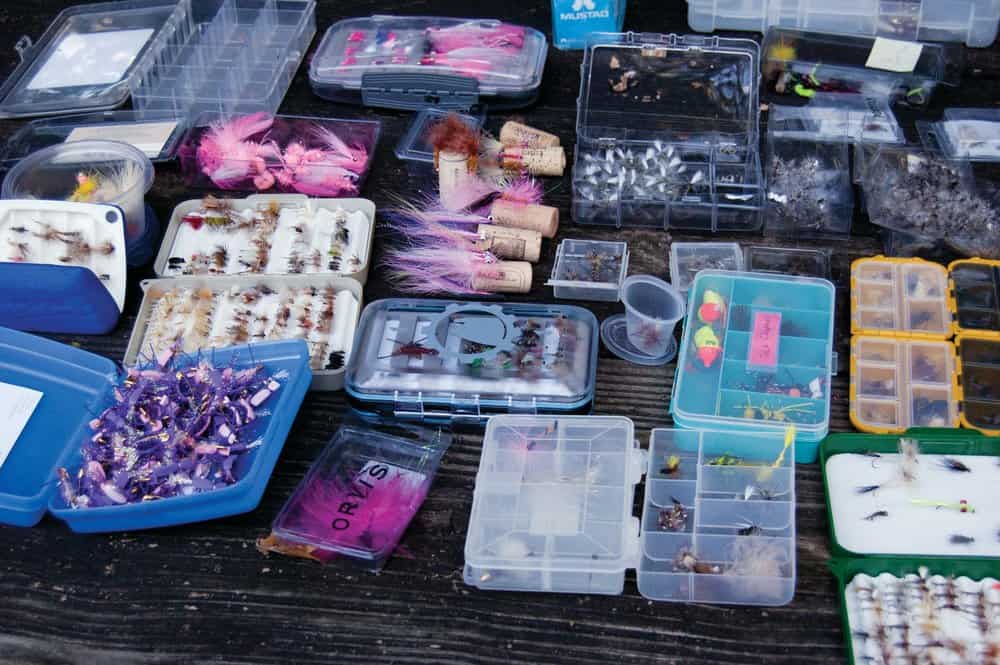 Casting for Recovery provides equipment for the new anglers and volunteers stock the fly boxes. Photo by Marty LeGrand
Casting for Recovery provides equipment for the new anglers and volunteers stock the fly boxes. Photo by Marty LeGrand 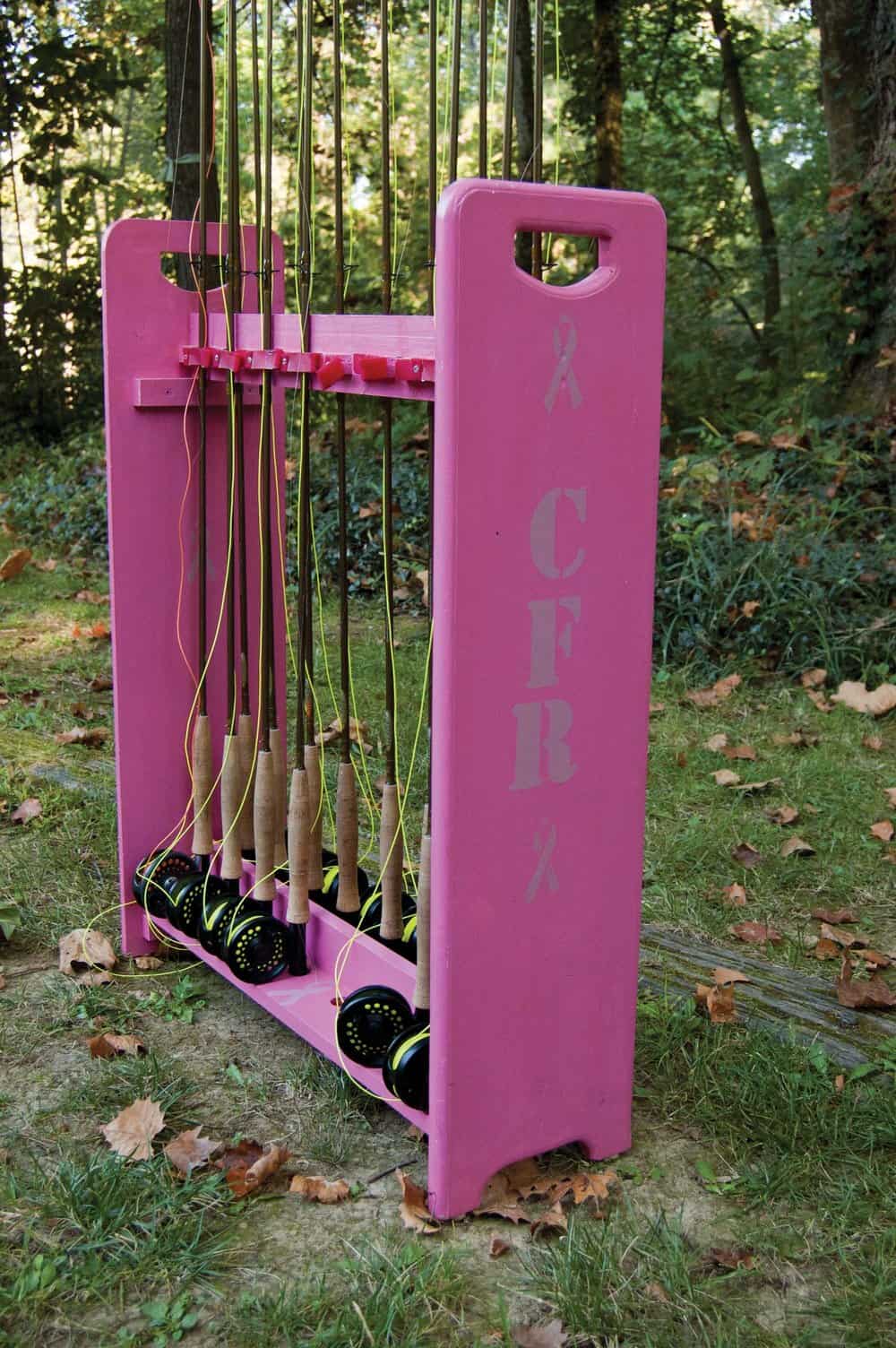 Photo by Marty LeGrand
Photo by Marty LeGrand
Several casts fail to draw a strike. “Maybe there’s only one trout in here,” Wendy muses. Brett smiles. “No,” he assures her, “there’s more.” Before long, she’s hooked a small, hatchery-bred rainbow, which hungrily swallows the fly. Brett carefully removes the fly’s de-barbed hook from the trout’s jaw and gently swishes the fish in the water until it’s strong enough to swim away. (All trout caught on this stretch of creek are released.)
In her zeal, Wendy manages to lose her lucky fly, a fuzzy-bodied, fluffy-tailed Woolly Bugger streamer rendered in Energizer Bunny pink. She has one more hooked in her Casting for Recovery baseball cap. But it’s a fly she hand-tied yesterday at a retreat workshop. Still, she insists on using it; she’s keen to catch more trout.
Founded in 1996, Casting for Recovery now offers more than 50 annual retreats nationwide, including this one hosted by its mid-Atlantic chapter. Over three days, participants gather at bucolic settings such as mountain lodges and woodsy conference centers. They bond, explore the physical and emotional challenges of their illnesses and together discover a new outlet to healing— fly-fishing. From accommodations to fishing instruction, every retreat is free to the 14 women who attend. For nearly three out of four, it’s the first support group they’ve joined.
No family members or friends accompany the women, who socialize and get to know one another through activities that promote mutual encouragement. In a session at last year’s Maryland retreat, attendees were shown pictures of differing portions of a stream, from rapids to tranquil pools to stagnant backwaters. Each woman was asked to share the setting she felt symbolized her recovery.
“Being around women who completely get it is huge,” one participant confides. The retreat’s empathetic mingling can be inspirational for everyone. “I like seeing the group gel,” says Pat Holden, a psychosocial counselor who worked at last fall’s Maryland retreat. “They jabber on and on. I love hearing that sound.”
The retreats don’t dwell on cancer, however. Which is where fly-fishing comes in. Conceived by a breast reconstruction surgeon and a veteran fly fisher, Casting for Recovery promotes the sport as both physical therapy and mental diversion. The easy rhythms of fly-casting simulate stretching exercises recommended for cancer patients, whose mastectomy and radiation scars make upper body movements stiff and painful.
“It uses those muscles that oncologists encourage us to use,” explains Carolyn Harvey, Casting for Recovery Mid-Atlantic’s co-program coordinator and a breast cancer survivor herself. She’s become so devoted to the program she hosts an annual reunion for past participants along the Gunpowder River near her home.
Harvey and several volunteers belong to Chesapeake Women Anglers, which promotes women’s fly-fishing (fresh and saltwater) through education, mentoring and fund-raising for events such as this. Male volunteers are avid anglers, too, some whose lives cancer has also touched. Bill, a beaming retiree in a frayed straw hat, survived prostate cancer. Raised in tenement housing in the Bronx, he became a successful businessman and now lives in affluent Great Falls, Va. “I felt it was time to give back,” he says.
“You’ll catch ten times less fish fly-fishing, but it’s ten times more relaxing,” another river helper tells the woman he’s coaching. Her cancer was diagnosed 17 months ago during a routine mammogram. She’s had chemo and radiation treatments, the latest less than three months ago. As he stands behind her, she unfurls a textbook cast and slowly retrieves the line as she’s been taught. A quick learner, she still has yet to catch a trout. “That’s fly-fishing,” he tells her.
As with all Casting for Recovery retreats, these women were selected by random lottery. More than 90 applied, according to Casey Peltier, co-program coordinator with Harvey. Nationwide, the program has served more than 8,000 women since its inception.
The morning wears on, but the women show no signs of tiring. A belted kingfisher swoops low and heads upstream. Rod tips poke above the creek-side vegetation, nodding solemnly as anglers try to lure fish. When a strike occurs, it’s hard to tell who’s more delighted, student or mentor. There’s usually a triumphant yelp and a high-five, or a mutual groan if the fish slips the hook, as sometimes happens when an excited angler raises her rod too quickly.
Wednesday already lost one fish to overanxiousness. “Plus, I was talking. That’s a problem with me,” she says, flashing a sheepish grin. Chris, a volunteer from Pennsylvania, advises her to pause before trying to set the hook: “When you feel a bite say to yourself, ‘God Save the Queen’ first.”
The royal invocation works. Wednesday reels in a 12-inch rainbow, caught on an Adams dry fly. She’s thrilled, but so fearful of losing it that instead of reeling it all the way in she walks backward, rod held high, until Chris can net the wriggling trout. Overcoming initial squeamishness, Wednesday plunges both hands into the net, corrals the trout and holds it for all to see. Women fishing nearby cheer and take pictures.
After several hours, anglers, helpers and organizers break to eat bag lunches beneath a large sycamore tree. Fish tales are swapped and life stories shared. The babble of unification continues. The day, the setting and fly-fishing are providing a welcome diversion.
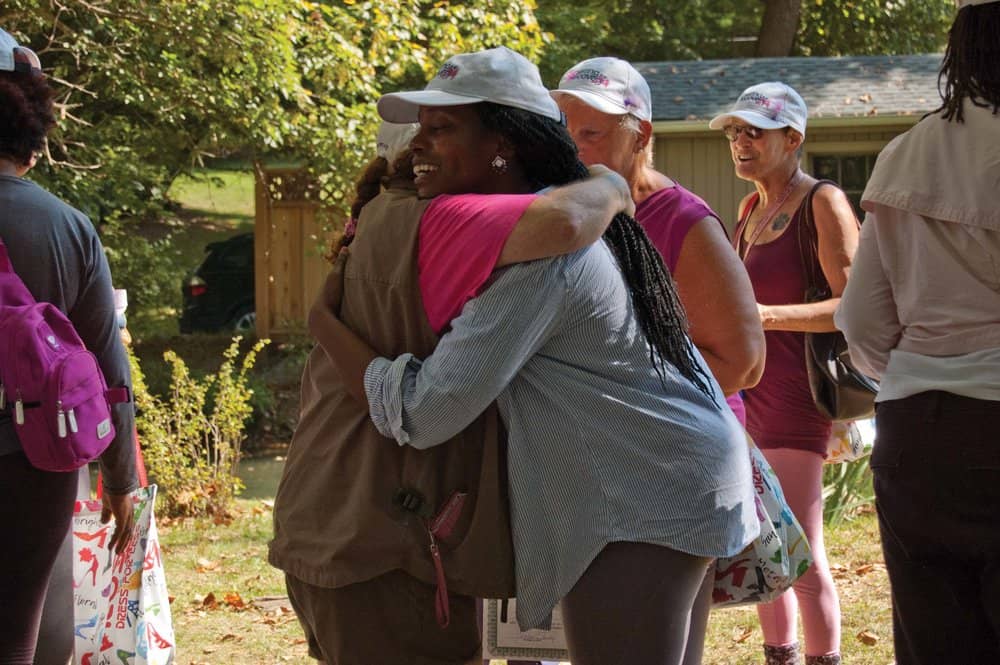 Being around women who completely get it is huge,” one participant confides. Photo by Marty LeGrand
Being around women who completely get it is huge,” one participant confides. Photo by Marty LeGrand
“The best part for me is the sense of accomplishment,” Wednesday says. “I caught a fish!” She says she’s tired of not being able to do things for herself while she recovers, of having to rely on others. Just above her chest waders, she sports a tattoo that says “Warrior.” There’s a bronc-riding cowboy inked on her left arm, a Native American bear claw on her right. On her cap, she’s affixed a pink fly she learned to tie. She plans to display it on her desk at work, a token of accomplishment and reclaimed self-reliance.
Several women had yet to catch a fish when the group broke for lunch. Once fishing resumes, one of them, Mary Jo, hooks a trout in the little spillway pool where Wendy had success. She proceeds to catch two more fish, holding the second trout up to her mouth as if she’s going to kiss it. “Thank goodness we got to the honey hole,” Mary Jo tells her helper.
As 2 p.m. approaches, organizers begin packing up rods and disassembling them. Peltier spies a fly rod leaning against a tree and asks the woman who’s been using it whether she’s done fishing, “Well … ” comes the hesitant reply. “That’s okay,” Peltier says.
When everyone is finally finished, Peltier and Harvey conduct a graduation ceremony, doling out praise and goodie bags filled with bath balms, fishing magazines, Casting for Recovery water bottles and other mementos. The women pass around their smart phones, comparing photos of fish they caught. They hug and promise to stay in touch. This marks their final get-together.
As anglers and helpers gather creek-side for a group photo, Peltier leads them in a chorus of “Row, Row, Row Your Boat” with lyrics customized for the occasion: “Cast, cast, cast your lines/Gently down the stream/Merrily, merrily, merrily/Life is but a dream.”

